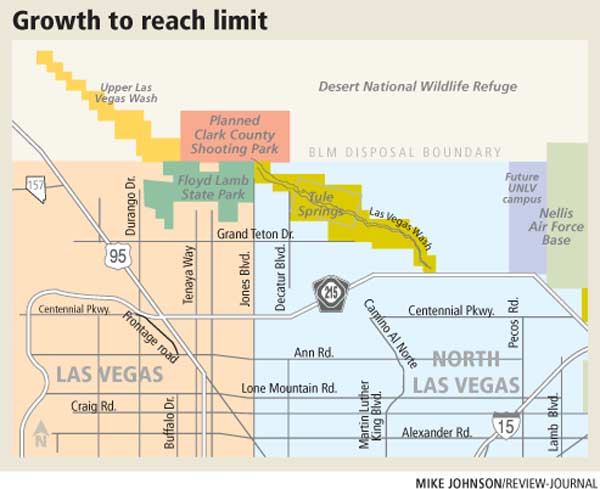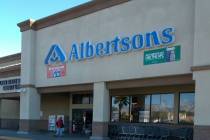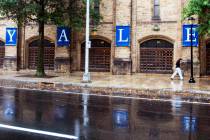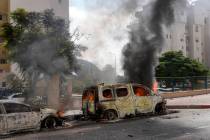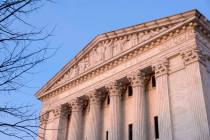Las Vegas pushing growth to limits
In far northwest Las Vegas, the city ends abruptly. One side of the street has houses and sidewalks, and the other has open space, including an environmentally sensitive area called the Upper Las Vegas Wash.
The city's recent budget woes have thrown the economic implications of that area into sharp relief, because it's one of the few places left for the city of Las Vegas to expand. It's also home to rare plant life, mammoth remains and other valuable fossils.
"If you don't have growth, then it could have a potentially large impact on the growth of (tax) revenue," said John Restrepo, a consultant who has analyzed Las Vegas' finances. "They won't be able to get their fair share of future growth" in Southern Nevada.
But finances can't be the only consideration on the table, said Jill DeStefano, who is part of a group pushing for conservation in the wash.
"Everybody's still having children. The population will grow. People still need housing. All we're saying is, there's some acreage that's just too precious to build on."
Las Vegas is the first of the valley's cities to bump against its geographic growth limits. That will have far-reaching impacts on the city's ability to keep up with expenses and, possibly, the way future development proceeds.
"I don't think there's any illusions that the city is landlocked," said Jeremy Aguero of Applied Analysis, who has studied growth in Las Vegas. "I don't think there's any other economy you can find that is as dependent on growth as Southern Nevada.
"When you're dependent on growth and your city is landlocked, it does not bode well."
It's not all bad news, though. For instance, Las Vegas is taking the right track in trying to redevelop downtown areas, "taking less productive uses and turning them into greater intensity and greater productivity," Aguero said.
Nor is the city alone, he added: "At some point, the valley's going to be facing the same fate that the city of Las Vegas is showing us today. We're all going to have to deal with that."
Las Vegas had to reduce spending by $20 million this year because of the economic slump, which depressed collections of the consolidated sales tax, or "c-tax."
Shortfalls of more than $40 million are expected in the next two budget years, and the city plans to hold positions vacant, trim capital spending and dip into reserves to make up the difference.
But the long-term picture could be tough as well. The city's chief sources of revenue -- the consolidated sales tax and property taxes -- rely on growth to increase. Those taxes are fed by purchases of homes and furnishings, and the addition of residences to property tax rolls.
City projections are that the consolidated sales tax, which has been the city's main source of operating revenue, will grow an average 4.5 percent a year through 2013. Overall revenues are expected to grow about 5 percent a year.
That's lower than the last eight years when, except for a period following the Sept. 11, 2001, terrorist attacks, the c-tax's growth rate alone ranged from 8 percent to nearly 20 percent per quarter.
Expenses, meanwhile, are expected to eat up that revenue growth. The biggest is the cost of labor, which is projected to rise an average of 6.7 percent per year during that same period, an overall increase of more than $90 million.
Because Las Vegas is limited in where it can grow, city leaders have endorsed the smallest of six options the Bureau of Land Management put forward for protecting the Upper Las Vegas Wash -- a 2,900-acre conservation area to the north and northwest of the city. The BLM expects to release a draft environmental study next month.
The largest option would set aside 13,000 acres and would stretch from northern North Las Vegas to the Paiute Reservation.
Councilman Steve Ross, who represents northwest Las Vegas, said "it would be premature" to discuss land use in the area until a Utah State University environmental impact study is complete.
"The city believes in protecting the environment while also providing an opportunity for growth," Ross said is a written statement.
Expanding to the north isn't the only response to tight budgets. City staff has been ordered to review all programs and departments to see what can be cut or eliminated. That report is due later this year.
City leaders also want to look at reworking the contracts with the various unions that represent city employees so that personnel costs don't expand faster than the city's ability to pay.
DeStefano noted the oft-stated idea that Las Vegas' best future is to "grow up" instead of out, with people living and working in high-rises.
"We may have to grow up," she said. "And with the cost of gas, people may want to live where they work."
Councilman Larry Brown, who is running for the Clark County commission, summed up the city's situation at a recent candidate forum.
"The days of double-digit revenue growth are over," he said. "We're going to come back. But we're going to come back as a different animal."
Contact reporter Alan Choate at achoate@reviewjournal.com or 702-229-6435.



